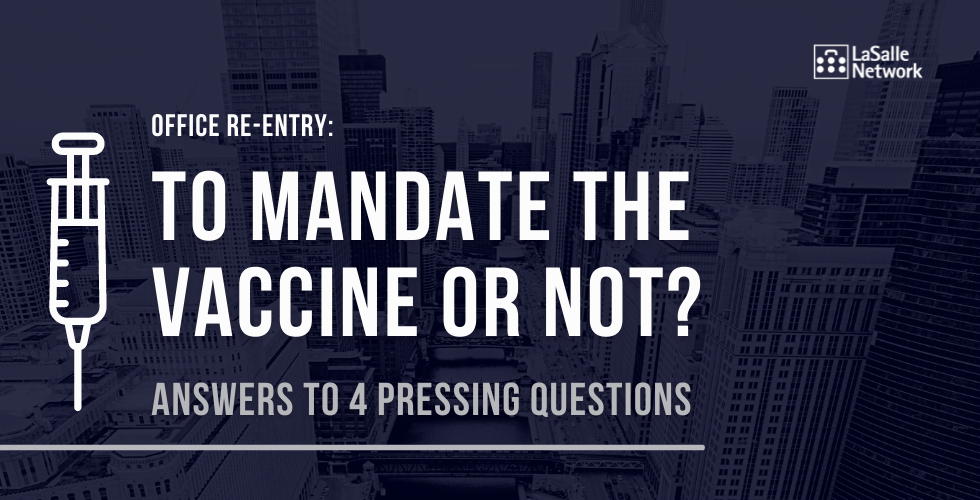Last week, we hosted a virtual panel about office re-entry and the obstacles and opportunities each company faced when bringing employees back into the office – hearing from companies that have already began re-entry efforts. (To hear the conversation, click here.) To register for the second installment of our Office Re-Entry virtual series on July 15, click here.
During the event, we polled attendees on if their organizations plan to require employees to be fully vaccinated in order to return to the office. 72% responded no, which is an increase from 52% in a LaSalle Network survey conducted in March 2021.
Below, we share responses to 4 pressing questions regarding the legal implications for deciding whether to require employees be fully vaccinated before coming back into the office.
Can employers require employees receive a COVID-19 vaccine?
According to the Equal Employment Opportunity Commission(EEOC), employers can require employees get vaccinated as a condition of going to work. However, they must be prepared to exempt employees with disabilities and religious objections. In those cases, an employer must offer a reasonable accommodation to the employee—such as working remotely or being reassigned—as long as the accommodation doesn’t cause undue hardship for the employer.
Can an employer terminate an employee who refuses to be vaccinated?
In limited cases, yes. Employers will need to make reasonable accommodations to employees seeking an exemption due to disability-related reasons or religious objections. Employers will need to follow the established reasonable accommodation process under the ADA and Title VII before taking any adverse employment actions. The employer would have to establish that an employee who is not vaccinated poses a direct threat and cannot perform their job remotely.
What are some of the legal risks for mandating the COVID-19 vaccine?
The FDA authorization for the COVID-19 vaccine is only pursuant to the Emergency Use Authorization standard—which is different than an FDA licensure of a vaccine—and therefore these vaccines have not received all of the prolonged consideration by the FDA that is typical of most common vaccinations. As a result, employers mandating the vaccine should be prepared for some resistance from employees.
An employer-mandated vaccine is considered a part of work, so under most state laws, an adverse reaction to the vaccine would be covered by workers’ compensation. If an employer merely encourages employees to obtain a vaccine, coverage under workers’ compensation policies may not be available.
Could there be a liability for not requiring vaccination?
It is possible that if a mandatory vaccination policy is not imposed, employees may allege the employer failed to provide a safe and healthy work environment as required by the Occupational Safety and Health Act (OSHA). In this case, the employer would need to provide evidence of whether appropriate safety protocols were followed.
Stay up-to-date with city, county and state policies regarding vaccination in the event that public health authority guidance adopts the view that employers should not permit unvaccinated employees into the workplace.
For more information on employee vaccinations and other office re-entry trends, download our Office Re-Entry Index here.
To register for the second installment of our Office Re-Entry virtual series on July 15, click here.
If you’re hiring, let us help. Get connected with us here.
Other stories you may be interested in:





